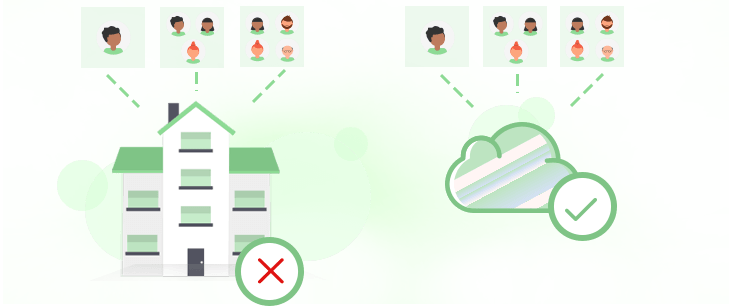
While selecting a new sales management software for your business, one of the most important factors which you should consider is whether you’ll choose to have your software on-premise or online.
Online sales management software is now more common than ever before, but on-premise software have their fair share of benefits too.
To understand which platform would be best for your business, let’s look at the requirements list: –
Understanding your requirements
Before you set out to choose a sales management software, there are some pointers which you’d need to keep in mind: –
- Are you willing to shed out a huge sum as set up costs as all the hardware and dedicated servers for running the sales management software?
- Are you willing to have a developer on your payroll who would constantly work on maintaining your software?
- How confidential is the data that you will be handling and how important is security to your business?
- Is your business constantly expanding? In which case, would you require continuous upgrades and customization?
- Is your business spread across different locations or are you planning on spreading your business across different locations?
- Do you require to check different types of reports on a day to day basis?
- Are you looking to constantly track all your field sales agents?
Did I overwhelm you with all those questions? My bad! :P
Let me help you figure out which system would be best for your business by answering each of the above questions.
On-premise vs Online Sales Management Software
Setup cost 
On–premise Sales Management Software
- A hefty setup cost is involved for building an on-premise software. These costs may start from as high as $10,000 and can go up based upon requirement. This involves all the hardware, server and cost of creating a sales management software from scratch.
- With on-premise sales management software, upgrade or customization can be very expensive and deployment of these upgrades may take a while.
- On-premise software requires constant maintenance. This can be costly for a small or medium sized business.
- On the bright hand side, if you have many users, then you can save money. Online platforms charge you based on the number of users. Building your own software can be prudent in the long run.
Online Sales Management Software
- There is no need to dish out a huge sum as set up costs as all the hardware and servers for running the software are hosted by the vendor. This makes online sales management software a more economical choice.
- Online sales management software charges you per user. The charge per user can be as low as $25/user/month. This is a more economical choice for small and medium-sized businesses.
- The customization of the software is easy and readily available. It can be deployed almost instantly. The cost incurred for such customization is very minimal as compared to its counterpart.
- You don’t have to worry about maintenance and the additional costs and hassle that come with it, as it is the responsibility of the vendor. This again makes online sales management software a more feasible choice.
Data Confidentiality and Access

On-premise Sales Management Software
You get complete control of all your data and systems. You needn’t worry about data theft, as your data is not hosted on a third-party server. The limitation with every on-premise software is that you cannot access your data while on the go.
Online Sales Management Software
Businesses are usually hesitant when it comes to storing their data on a third-party cloud. Always ensure that you choose a reliable and secure vendor. You can have unlimited and easy access to your data irrespective of where you log in from. Hosting data on a cloud allows all users to easily access the data from any device. You also have the option to restrict the data access to your users based on your hierarchy.
Developer Cost

On-premise Sales Management Software
If you opt for having an on-premise software, then you’ll need to have a developer who would constantly work on maintaining your software from time to time. The Developer would take care of upgrades and other technological glitches. Having a developer for the sole purpose of managing your on-premise software means burning a hole in the pocket for small and medium-sized businesses.
Online Sales Management Software
An online sales management software saves you the hassle of hiring an additional employee on your payroll. Moreover, you needn’t worry about maintenance and the additional costs and hassle that come with it, as it is the responsibility of the vendor. The vendor also takes care of upgrades and other technological glitches ensuring a hassle-free experience for you.
Scalability

On-premise Sales Management Software
Scaling up an on-premise software is a very costly option. It involves cost of manpower, resources and ends up burning a huge hole on your pocket. It might not be feasible to scale up the software to just add a user or two.
Online Sales Management Software
You can scale up or down an online sales management software based on your business requirement easily. Online software gives you the freedom to select the plans based upon your requirement.
Geographically spread teams

On-premise Sales Management Software
It is very difficult and costly to build an on-premise sales management software for teams which spread across different geographical locations. Moreover, a lot of time is taken for any upgrades or customization to be deployed across every location. The data processed across different sales teams take time to be visible to others, which can lead to inefficient sales tracking.
Online Sales Management Software
Online sales management software can be easily used by different geographical teams. The data being generated across different locations are accessible to everyone in real time. This means that your Headquarters in New York can instantly see a sale won in Arizona.
Reports

On-premise Sales Management Software
a. As your business evolves, you would be required to keep track of various sales KPIs. This would require you to create different reports over time as your business evolves. Creating new reports and deploying them on your on-premise sales software is a very challenging task. Moreover, if your sales teams are spread across the globe, then your reports won’t be accurate in real time as sync of data is delayed in on-premise systems. Moreover, creating new reports and debugging them is expensive as well.
Online Sales Management Software
An online sales management software comes with a plethora of reports for businesses of every size. Your vendor has a dedicated reporting team which constantly creates new reports and debugs them from time to time. If you require any custom report, tailored exactly to your requirements, then your vendors can create them at a very minimal price. You wouldn’t have to pay any additional cost for timely maintenance and debugging.
Field Sales Tracking 
On-premise Sales Management Software
In an on-premise sales management software, creating mobile apps to track your sales agent can be a hard task as all your data is hosted on an on-premise server. Creating and deploying a mobile app takes a lot of time.
Online Sales Management Software
Hosting data on cloud allows you to create mobile apps to track your field sales reps. These apps take data from cloud servers while on the go. It can be hosted on app stores and downloaded by your team allowing you to manage your sales reps in real time.
Conclusion
Both the systems have their own pros and cons. However, the pros of an online sales management software overweigh its counterpart – making it a more viable choice for a constantly growing business. To manage your sales efficiently from any part of the globe – try LeadSquared!









